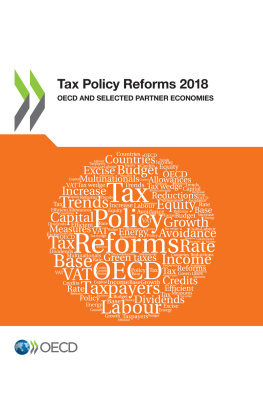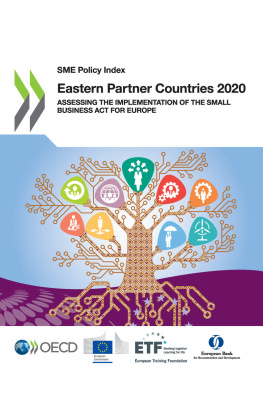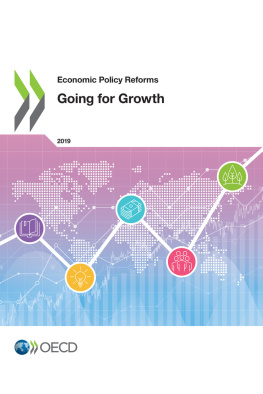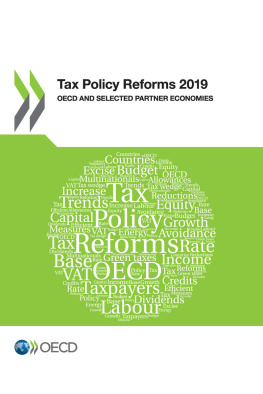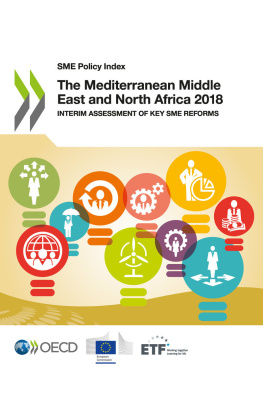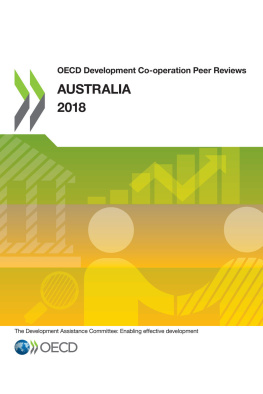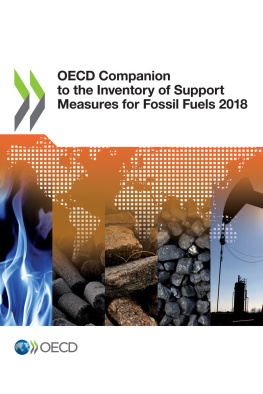coll. - Tax Policy Reforms 2018 OECD and Selected Partner Economies
Here you can read online coll. - Tax Policy Reforms 2018 OECD and Selected Partner Economies full text of the book (entire story) in english for free. Download pdf and epub, get meaning, cover and reviews about this ebook. year: 2018, genre: Politics. Description of the work, (preface) as well as reviews are available. Best literature library LitArk.com created for fans of good reading and offers a wide selection of genres:
Romance novel
Science fiction
Adventure
Detective
Science
History
Home and family
Prose
Art
Politics
Computer
Non-fiction
Religion
Business
Children
Humor
Choose a favorite category and find really read worthwhile books. Enjoy immersion in the world of imagination, feel the emotions of the characters or learn something new for yourself, make an fascinating discovery.
Tax Policy Reforms 2018 OECD and Selected Partner Economies: summary, description and annotation
We offer to read an annotation, description, summary or preface (depends on what the author of the book "Tax Policy Reforms 2018 OECD and Selected Partner Economies" wrote himself). If you haven't found the necessary information about the book — write in the comments, we will try to find it.
Tax Policy Reforms 2018 OECD and Selected Partner Economies — read online for free the complete book (whole text) full work
Below is the text of the book, divided by pages. System saving the place of the last page read, allows you to conveniently read the book "Tax Policy Reforms 2018 OECD and Selected Partner Economies" online for free, without having to search again every time where you left off. Put a bookmark, and you can go to the page where you finished reading at any time.
Font size:
Interval:
Bookmark:
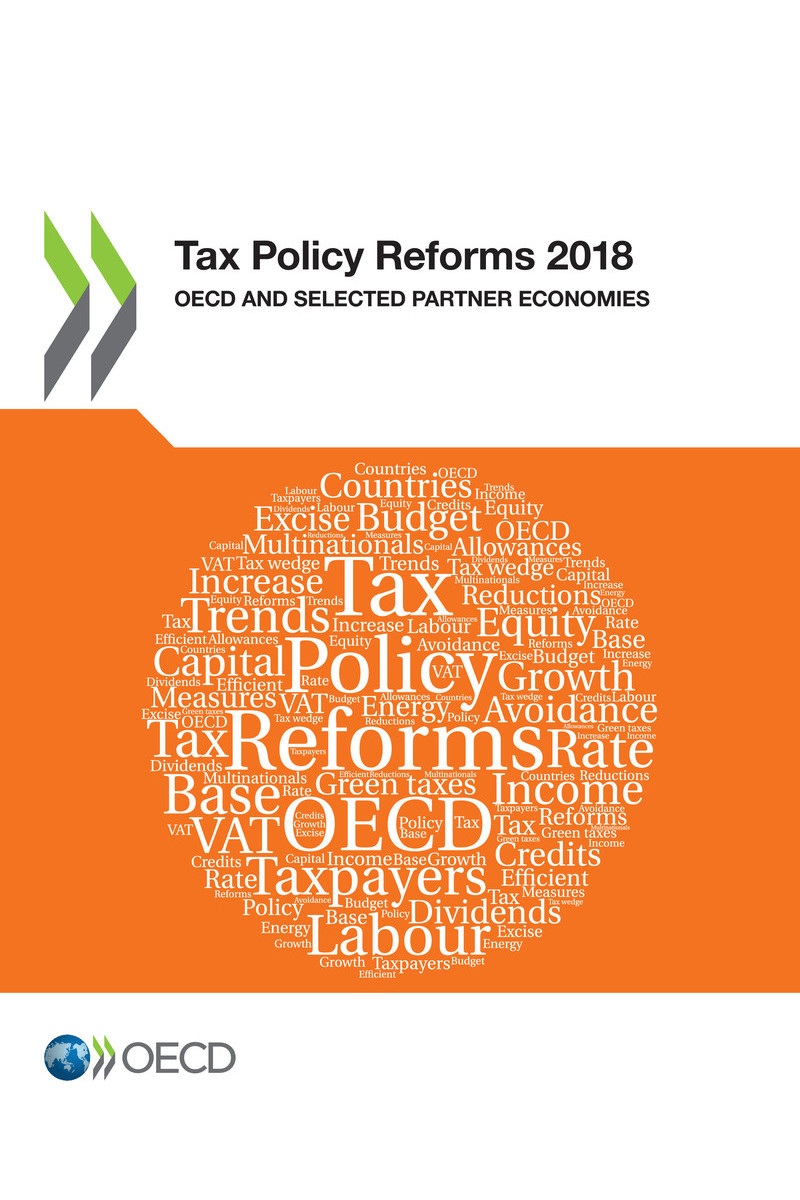
OECD (2018), Tax Policy Reforms 2018: OECD and Selected Partner Economies , OECD Publishing, Paris.
https://doi.org/10.1787/9789264304468-en
This is the third edition of Tax Policy Reforms: OECD and Selected Partner Economies , which is an annual publication that provides comparative information on tax reforms across countries and tracks tax policy developments over time. The report covers the latest tax policy reforms in all OECD countries, as well as in Argentina, Indonesia and South Africa.
This report was produced by the Tax Policy and Statistics Division of the OECDs Centre for Tax Policy and Administration. It was led by Sarah Perret and written jointly with Vronique Salins (Economics Department), Johanna Arlinghaus, Stphane Buydens, Tibor Hanappi and Sean Kennedy (Centre for Tax Policy and Administration), under the supervision of Bert Brys. The authors would like to thank the delegates of Working Party No.2 on Tax Policy Analysis and Tax Statistics and the Committee on Fiscal Affairs for their inputs. The authors would also like to acknowledge Piet Battiau, Sveinbojrn Blondal, David Bradbury, Giorgia Maffini, David OSullivan, Nigel Pain, Alvaro Pereira, Pascal Saint-Amans, Michael Sharratt, Carrie Tyler, Kurt Van Dender, and Karena Garnier as well as the country desks of the OECD Economics Department for their support and valuable comments.
The report includes all OECD countries as at 1 January 2018.
With monetary policy starting to return to normal in many countries, support provided by fiscal policy, including to a large extent through tax policy, has become more significant. Many countries have eased their fiscal stance to stimulate the economy by lowering taxes, increasing government spending, or both. This years report highlights that the focus of the most recent tax reforms has been on cutting taxes on businesses and individuals with a view to boosting investment, consumption and labour market participation, continuing a trend that started a couple of years ago.
Among the countries that introduced the most significant tax reforms were a number of countries where tax reform was long overdue. The United States introduced the most sweeping tax reform, which completely overhauled its tax system, including both business and personal taxes. The year 2018 also saw the entry into force of significant tax reform packages in Argentina, France and Latvia. Broad tax reform packages are consistent with the view that tax systems should be considered as a whole and that, as opposed to looking at tax policies in isolation, the focus should be on the efficiency and equity effects of the overall tax system.
Other countries have introduced tax measures in a more piecemeal fashion, but many of these measures are a step in the right direction . A number of countries have sought to encourage greater labour market participation, most notably through the expansion of earned income tax credits. Efforts have also been made to broaden tax bases and to continue the fight against international corporate tax avoidance, in line with the commitments made by countries to implement the minimum standards and recommendations agreed upon as part of the OECD/G20 Base Erosion and Profit Shifting (BEPS) project. Administrative improvements and anti-fraud measures, in particular in the area of VAT, were also among the measures commonly adopted to enhance efficiency and collect greater tax revenues.
Going forward, however, greater action and coordination will be needed to avoid certain risks:
With global economic growth now closer to longer-term norms, the need for additional short-term fiscal stimulus is significantly lower. Fiscal policy choices should avoid the risk of excessive pro-cyclicality and be focused on medium-term challenges. Despite being on a declining trend, public debt and deficit levels remain high in many countries. As economic times improve, there is an opportunity to rebuild fiscal buffers, which will ultimately give more room for policy stimulus in the event of any future downturn. The focus of tax reforms should also shift to supporting the longer-term drivers of growth and equity. In this context, it is particularly important that tax reforms be financed in a manner that ensures their long-term sustainability.
Continued cooperation will also be important to prevent harmful tax competition. So far, while the declining trend in the average OECD corporate tax rate has gained renewed momentum since the crisis, corporate tax rate reductions are still less pronounced than before the crisis. Besides, the countries that introduced corporate tax rate cuts in 2018 included some of the countries that had the highest tax rates in 2017. If anything, these countries appear to be engaged in a race to the average rather than in a race to the bottom, with their recent corporate tax rate cuts now placing them in the middle of the pack. There will be much interest in observing how countries respond to this trend in the future.
The report also highlights the crucial need to continue addressing equity issues and environmental challenges, which remain significant despite progress in recent years.
Tax policies should continue to focus on inclusiveness to ensure that improvements in incomes and standards of living are shared widely across the population. This is especially true in a context where positive developments in terms of employment are being overshadowed by wage stagnation, especially for low-wage workers. While there have been continued cuts in personal income taxes for low and middle-income earners, these have typically been small. In general, there is still ample scope to strengthen inclusiveness through tax systems, in particular by continuing to lower-labour tax wedges on low and middle-income workers, removing tax expenditures that disproportionately benefit the wealthy, and ensuring the effective taxation of personal capital income. Efforts to partly shift the financing of welfare systems from social security contributions towards general taxation could also be pursued further. Identifying the winners and losers of tax reforms and adequately compensating those who will lose out from new tax measures, particularly where they are at the bottom of the income and wealth distribution forms part of an inclusive tax agenda.
Font size:
Interval:
Bookmark:
Similar books «Tax Policy Reforms 2018 OECD and Selected Partner Economies»
Look at similar books to Tax Policy Reforms 2018 OECD and Selected Partner Economies. We have selected literature similar in name and meaning in the hope of providing readers with more options to find new, interesting, not yet read works.
Discussion, reviews of the book Tax Policy Reforms 2018 OECD and Selected Partner Economies and just readers' own opinions. Leave your comments, write what you think about the work, its meaning or the main characters. Specify what exactly you liked and what you didn't like, and why you think so.

